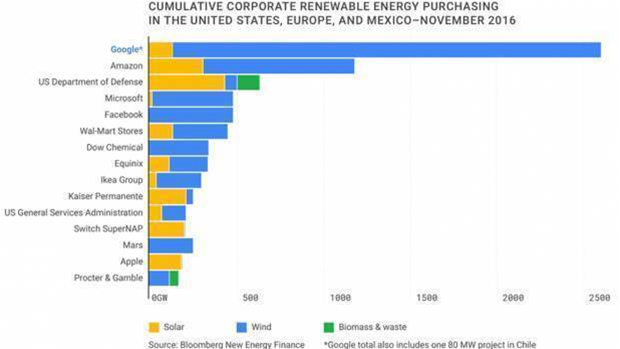Google is on track to run the entirety of its operations on renewable energy by 2017.
In a blog post on the company's website, the internet giant made the bold claim that, by next year, it will run its offices and vast data centres 100 percent on renewable resources.
While this doesn't mean that solar and wind power will directly power every single server in Google's machine, it does mean that the company will purchase as much renewable energy as it uses electricity each year.
Google is already the number one global corporate buyer of renewable energy, having last year bought 44 percent of its power from solar and wind farms. Crucially, Google says the move to raise that figure to 100 percent isn't an effort to green-wash its operations, but rather a logical business decision.
“Over the last six years, the cost of wind and solar came down 60 percent and 80 percent, respectively, proving that renewables are increasingly becoming the lowest cost option,” Urs Hölzle, senior vice president for technical infrastructure said in the blog post.
“Electricity costs are one of the largest components of our operating expenses at our data centers, and having a long-term stable cost of renewable power provides protection against price swings in energy.”

(Image: Google)
EU energy lead at Google, Marc Oman, told The Guardian that it had taken the company five years to get close to its 100 percent target due to the complexity of negotiating power purchase agreements. “It's complicated, it's not for everyone: smaller companies will struggle with the documents. We are buying power in a lot of different jurisdictions, so you can't just copy and paste agreements.”
Oman also said that, while wind and solar had been the cheapest options up to 2017, Google is looking at investing over the next 10 years in other forms of low-carbon power, including hydro, biomass and nuclear. With the latter, he noted that the nuclear option is “controversial”, but that he didn't want to rule it out if an agreement “meets our goals of low price, safety, additionality and in a sufficiently close grid”.
The move comes at an important time for the future of renewable energy, when a great deal of uncertainty surrounds Donald Trump's approach to the environment. In the past, Trump has opposed the construction of wind farms close to his company's resort near Aberdeen. He also famously tweeted that global warming was “created by and for the Chinese in order to make US manufacturing non-competitive”.
In what looks a lot like a direct nod to Trump, Hölzle calls tackling climate change “an urgent global priority” and says the private sector has a responsibility to take “bold steps” in a way that leads to growth and opportunity.





.png&h=142&w=230&c=1&s=1)
_(21).jpg&h=142&w=230&c=1&s=1)






.jpg&w=100&c=1&s=0)











